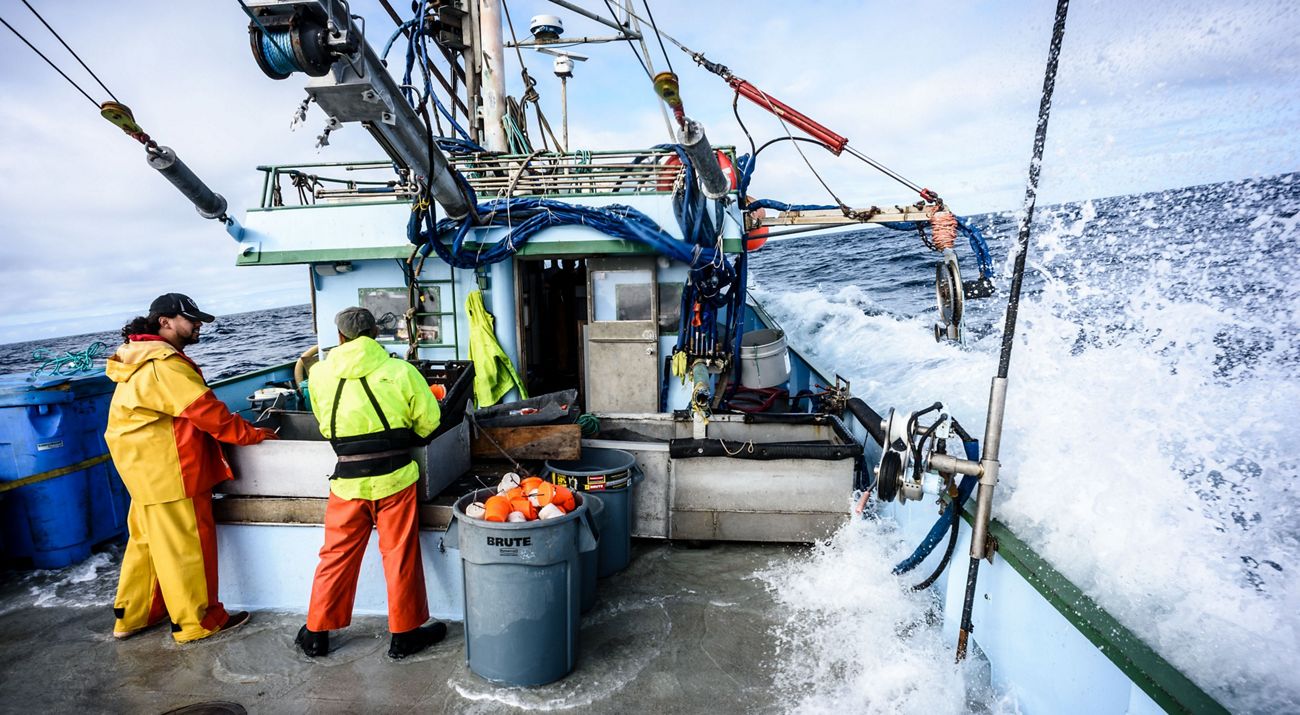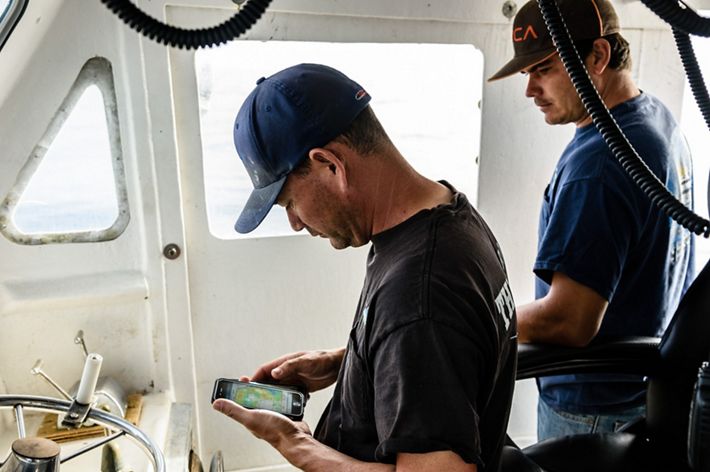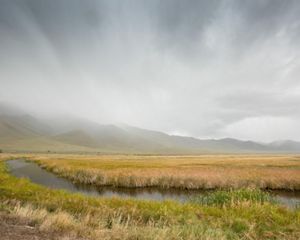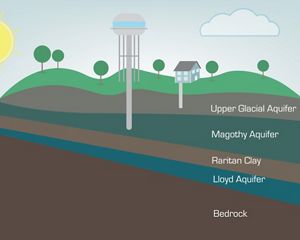“You see the same pattern go on for a number of years, and then all of a sudden—a drastic change,” says Kurt Martin, a commercial fisherman, speaking about the impacts of climate change he’s seen in New England, from changes in surface sea ice to fish species that have shifted away from normal fishing grounds. “It’s hard to change as fast as things are changing climate-wise.”
Martin’s experience with a changing ocean is mirrored across the world as fishermen and communities strive to adapt to the diverse and often dramatic impacts of climate change . Over 90 percent of heat produced by human activities has been absorbed by the ocean , leading to changes in temperatures, circulation, and weather patterns, and even the chemistry of the ocean itself (a process known as ocean acidification).
Meanwhile, important global fisheries, from Maine lobster to Humboldt Current anchoveta, are experiencing shifts in the productivity and distribution of species, leading to significant economic losses and shocks to seafood supply chains.
When marine habitats and fish populations are healthy, they are better able to withstand the impacts of climate change. However, a history of habitat loss, pollution and overfishing has reduced the ability of ocean ecosystems to withstand climate-related stressors.
Climate change is also challenging existing policies and institutions responsible for sustainable management. Often, regulations that govern fisheries have been designed with static, stable systems in mind, but climate change brings dynamism and uncertainty. While there are bright spots, many government agencies are limited in their ability to adapt policies, data collection programs that guide management plans, and management actions to keep pace with climate change.
Around the world, staff at The Nature Conservancy (TNC) and partners are filling a critical gap in the global dialogue about adapting fisheries to climate change. We are generating new science, leading demonstration projects on-the-water, and leveraging key partnerships to implement management policies that ensure healthy oceans—an approach we call climate-ready fisheries.
Climate Impacts to Our Ocean and Marine Fisheries
-
The ocean has absorbed 93% of additional heat caused by humans and sequestered 30% of the CO2 emissions that humans produce.
-
Changes in ocean temperature have direct impacts on fish metabolic demands, distribution and growth.
-
Small boat fisheries account for around 40% of global catch. Subsistence and artisanal fisheries are the some of the most vulnerable to future climate change.
Scientific Foundation for Climate-Ready Fisheries
Whether digging into local issues, such as species range shifts in the U.S. Northeast shelf, or leading collaborative working groups to better understand community responses to climate change in the US West Coast and Kenya, science underpins our approach to building climate-ready fisheries.
Recently, a team of TNC scientists and practitioners set out to build a science and management framework for implementing climate-ready fisheries, with the overarching goal of changing how we manage fisheries in the face of climate change. We learned that although there is a growing body of knowledge about impacts of climate change on our ocean and fisheries, there are limited examples and concrete actions for adapting—or a gap in “climate-readiness."
“We know adaptive fisheries management helps us achieve ‘climate-ready’ fisheries,” says Jono Wilson, TNC’s lead scientist for global fisheries, who leads climate-ready fisheries work on the ground in California and around the world. “The challenge is how to implement the right policies with uncertain information and few resources to do it.”
In response, we published a framework that focuses on involving fishery stakeholders in all aspects of the management cycle to implement climate-ready fisheries. Within this framework, essential steps for addressing climate change include:
- Using technologies to fill critical information gaps. When compared to outdated, paper-based systems, electronic data collection systems support more responsive decision-making;
- Experimenting to develop new adaptation approaches. Climate change demands creativity and policies that allow for experimentation, whether testing new fishing gears or adaptation solutions;
- Leveraging partners to bring more capacity. Partnerships between public and private actors can bring more science and management capacity needed to address climate change impacts.
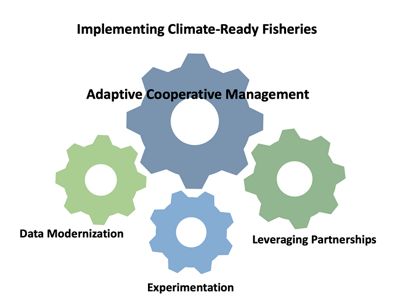
Climate-ready fisheries management is adaptive and responsive management that considers climate uncertainty and social and ecological interactions in a changing ocean. Under an adaptive management umbrella, it requires modernizing data systems, experimentation to test new adaptation solutions and leveraging partnerships to bring capacity and respond to changes.
TNC scientists and partners are leading a variety of key scientific publications around climate change and fisheries, as well as facilitating collaborative science working groups that ensure science translates into on-the-water action. We leverage our global geographic reach to share lessons between geographies experiencing similar challenges. For example, our scientists working in both the U.S. and Canada are applying similar methodologies to understand fishing community vulnerability to better inform management adaptations.
“Climate change demands science and collaboration that reaches across geographic, disciplinary and political boundaries,” says Jenn Burt, who leads the climate change and fisheries program for Nature United—a Canada affiliate of TNC. She adds, “Leveraging our fisheries expertise across provincial, state and national borders allows our teams to learn from each other and catalyze novel partnerships.”
On-the-Water Projects Build Climate Resilience
Building from our scientific foundation, we collaborate with fishermen and agency partners to test and demonstrate climate-ready strategies on the water.
Across the U.S., we are partnering with research institutions and communities to build climate resilience. In Alaska, a collaborative team from Cornell University and TNC is supporting fishing communities in evaluating adaptation strategies, like optimizing portfolios of fishing rights that can help diversify fishing opportunities and support conservation. In California, we are working with the University of California, Santa Barbara to evaluate management strategies that are optimal for fishermen, communities, managers and ecosystems under an increasingly dynamic ocean environment, with a focus on the Dungeness crab fishery. And we are exploring how to mitigate fishery disasters driven by extreme environmental events with market-based tools like insurance.
Responding to climate change requires fisheries managers to make proactive decisions based on high-quality information—often on short timelines. Yet many fisheries around the world depend on data collection systems that are either paper-based, or that require manual data entry and sharing across disparate data management systems. These inherently slow and effort-intensive systems limit both the amount of useful data that can be collected and shared as well as delaying the translation of information to action.
Modernizing fisheries information systems and expanding the use of electronic technologies can strengthen climate-ready fisheries management. From developing electronic monitoring systems in large-scale fisheries in the Seychelles and Chile, to local cases where community members record catches digitally in Mexico and Belize, TNC scientists are testing and implementing new approaches that leverage technology and partnering with stakeholders to improve fisheries data, which is the critical foundation for detecting environmental change and implementing improved management decisions.
For example, in the U.S. West Coast Dungeness Crab fishery, a collaboration between fishermen, scientists, conservationists and the technology sector led to the next generation web and phone application called CrabGear that tracks lost crab gear, facilitates at-sea recovery and facilitates sales back to original owners. Technologies such as this allow rapid responses to an increasingly dynamic ocean.
Climate Change Demands Nimble, Adaptive Fisheries Policy
Ensuring a climate-ready future for our oceans and fisheries requires broad action in areas from science to policy. Our policy work focuses on national and regional level efforts to build management systems that are nimble and resilient to dynamic ocean conditions.
Tackling an uncertain future—and developing effective regulations to meet that future—requires understanding the suite of plausible scenarios that climate change will bring. In collaboration with the U.S. Fishery Management Councils responsible for managing all federal fish stocks, we are defining these future scenarios and mapping out concrete policy responses. Since 2017, as part of a broader Climate and Communities Initiative with the Pacific Fishery Management Council, TNC staff have led a multi-stakeholder scenario planning process to identify barriers along the West Coast that may prevent adaptation.
“Building off this experience on the Pacific Coast, we are now deeply invested in supporting an East Coast scenario planning project in support of all three Atlantic Coast Fishery Management Councils, the Atlantic States Marine Fisheries Commission, and diverse fishing communities working to identify actions that ensure sustainable fisheries can persist and thrive despite climate impacts,” says Jay Odell, TNC’s Southeast region fisheries director.
Quote: Kate Kauer
TNC has led with science and on-the-water projects across North America and around the world, demonstrating what climate-ready fisheries management can look like.
Implementing Climate-Ready Fisheries at Local, Regional, and Global Levels
Although much of our climate-ready fisheries work began with North American partners, TNC has fisheries projects in over 20 countries and is dedicated to advancing climate-ready management around the world.
For example, along the West Coast of South America, the cool waters of the Humboldt Current fuel one of the world’s most productive fisheries—the anchoveta. In the anchoveta fishery and other Peruvian coastal fisheries, climate-readiness means ensuring our policy frameworks allow us to respond to the dynamic changes that we are seeing on the water.
In Mexico, TNC staff recently led an eight-week virtual training with a component on climate change impacts and adaptation tools, such as climate vulnerability assessments, delivered to Mexican fisheries managers via the online learning platform Capacidades Pesqueras, or “fisheries management capacities.” And in Kenya, TNC staff are supporting creation of national-level plans for climate adaptation in the fisheries sector.
“TNC has led with science and on-the-water projects across North America and around the world, demonstrating what climate-ready fisheries management can look like,” says Kate Kauer, Fisheries Strategy Lead, California Oceans Program. “With our expert staff and collaborative approach, TNC is in a unique position to continue leading transformations to sustainable and climate-ready fisheries that ensure healthy, resilient oceans.”
Featured Science Products
- Pacific Coast Fisheries Diversification Framework (.pdf)
- Wilson et al. 2019. Adaptive co-management to achieve climate-ready fisheries.
- Bell et al. 2020. Actions to promote and achieve climate-ready fisheries: summary of current practice.
- Lomonico et al. 2021. Opportunities for fishery partnerships to advance climate-ready fisheries science and management.
- Bellquist et al. 2021. The rise in climate change-induced federal fishery disasters in the United States.
- Collie et al. 2021. Harvest strategies for climate-resilient fisheries.
- Nelson et al. 2022. Perspectives on managing fisheries for community wellbeing in the face of climate change.
- Walker et al. 2020. Unusual occurrences of fishes in the Southern California Current System during the warm water period of 2014–2018.
Climate-Ready Fisheries Projects with TNC Leadership and Participation
Global Insights
Check out our latest thinking and real-world solutions to some of the most complex challenges facing people and the planet today.
